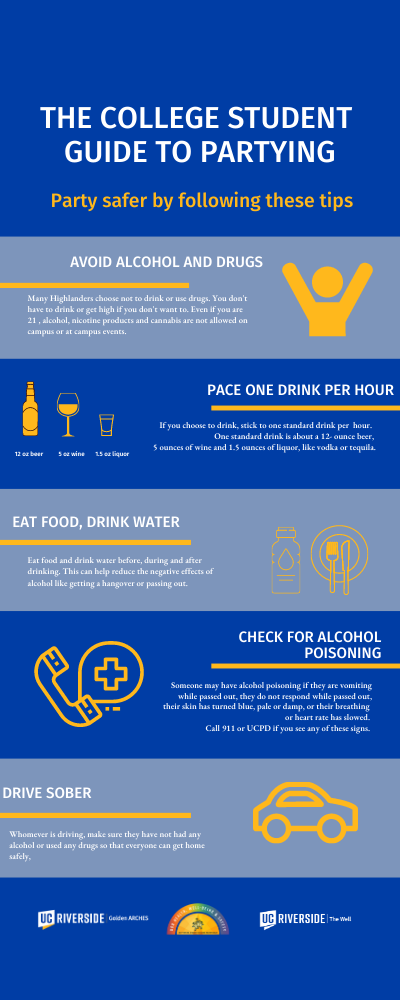Sustance Use Education
The Well is home to UCR Golden ARCHESstudent group dedicated to Alcohol use, Substance Use & Sexual Health Education at UC Riverside. Review our program calendar to learn more about upcoming Substance Use events related to Alcohol use, Substance use, ending overdose and safe partying, Don’t be afraid to ask for help for yourself or your peers!
If you would like to collaborate with us, or have us join your programs and access promotion materials for your student peers, please contact The Well's Student Health promotion Specialist at Daniel Lopez Salas at daniel.lopez-salas@ucr.edu.
Alcohol
Most UCR students choose not to drink or pace their drinks to one per hour when socializing. (NCHA 2016)
Binge Drinking
Binge Drinking can be dangerous and have unpleasant outcomes. Binge drinking is:
- Having 5 or more standard alcoholic drinks within a two hour period for people assigned male at birth.
- Having 4 or more standard alcoholic drinks within a two hour period for people assigned female at birth.
Standard drink
A standard drink is a 12-ouce beer, 5 ounces of wine and 1.5 ounces of liquor
BAC
Blood Alcohol Concentration (BAC) is the percent of alcohol in a person's bloodstream.
Some college students drink because they believe it will make them feel good. However, when a person's BAC reaches the "point of diminishing returns" no matter how much they drink, they won't feel better. In fact, they will feel worse. For this reason most social drinkers tent to maintain a BAC of 0.02%-0.06%
Check out this virtual bar to get an estimate BAC based on several factors
Safe Partying Tips
- Avoid alcohol and drug use
- If you drink, stick to one drink per hour
- Set a drinking limit beforehand
- Eat food and drink water before, during and after drinking
- Avoid hard liquor
- Alternate alcohol with non-alcoholic drinks
- Never mix alcohol with other drugs, even those prescribed to you
- Practice caution with edible cannabis products because they contain larger amounts of the active ingredient and can take several hours to peak
- If you see someone who has had too much to drink, keep an eye on them and step in to help as needed
- Stay at home or have a sober driver
- Always practice consensual behaviors. Never assume you have consent especially when the other person(s) are under the influence of alcohol/and or drugs
- Stay with trusted friends and have a sober friend there to help or intervene
- Pour your own drink and never accept an open container from anyone
Other Drugs
Resources on Campus
The Well's peer education group that provides workshop and events on alcohol and substance use education. You can request a program or become a member.
Learn about peer-led sobriety and recovery meetings, at UCR and other UC campuses.
The eCHECKUP TO GO program is a 10- to 15-minute, confidential interactive survey designed to assess how your use of cannabis/marijuana or alcohol might be affecting your overall health and wellbeing.
Get free Narcan and fentanyl test strips through The Well. Visit The Well's NARCAN webpage for more information
Visit well.ucr.edu/narcan for more information
Counseling and Psychological Services (CAPS)
Get one-on-one or group counseling for free.
Visit counseling.ucr.edu for more information
Student Affairs Case Management assists students dealing with mental health, academic, relationship, food insecurity and other stressful crises.
Visit casemanagement.ucr.edu for more information
Off-campus Resources
Riverside County Crisis Outpatient
769 W. Blaine St. Ste B Riverside, CA 92507
951-358-4705
Alcoholics Anonymous
Narcotics Anonymous
www.na.org
Helpful Links
Frequently asked questions about alcohol
Substance use disorders and other mental illnesses
Substance use and military life
Understanding drug use and addiction
